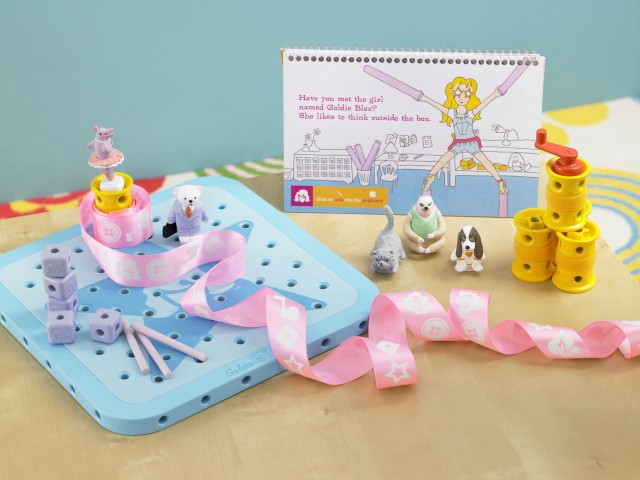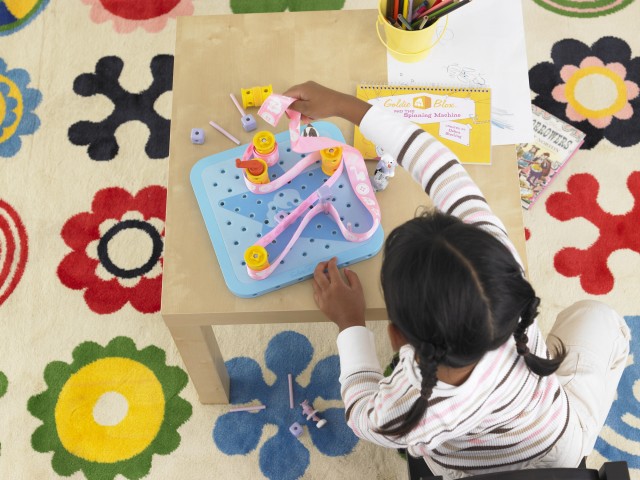New Toys: Talking With Engineer and GoldieBlox Founder Debbie Sterling
by Smiley Poswolsky

Debbie Sterling never thought about becoming an engineer until a college art professor told her she should consider it as a major. “I didn’t even know what engineering was,” she says. “I thought it was people in overalls making trains.” Eleven years later, after graduating as one of the few female engineering majors in her class at Stanford, Debbie’s launching a start-up toy company with the mission to get and keep young girls interested in engineering.
Working from her small San Francisco studio apartment, with only two full-time employees and a shoestring marketing budget, Debbie designed GoldieBlox, a toy/game/book combination that focuses on the character of Goldie, a sprightly, overalls-wearing girl with a tool belt and mismatched socks, who wants to be an engineer. Geared for 5–9-year-olds, the toy teaches spatial recognition skills via the toys and a companion storybook and game board. Debbie launched a Kickstarter campaign a month ago to pre-sell their first toy, and it’s already raised more than $285,000. I had a chance to interview Debbie about her awesome toy, and why the world needs more female engineers.
Debbie, when did you know you loved engineering?
I really liked art as a kid, and I had a college art teacher who said, “your drawing style looks very technical, have you thought about engineering?” I took Mechanical Engineering 101 at Stanford, and it blew my mind. It wasn’t like the stereotypes at all, it wasn’t nerdy, it was actually very artsy — we had assignments like designing an object to launch a tennis ball as far as you can using a soda can and a piece of string. I loved it.
Studies show that the majority of female college students aren’t interested in engineering by the time they get there, and that only 20% of women with a degree in math or science end up working in a related field. Was there a moment at Stanford that made you realize the engineering department wasn’t catering equally to women?
It was instantly obvious — there were mostly men in all of my classes. The engineering major at Stanford is 80% male, and only about 10% of engineers in the U.S. are women. My friends thought it was kind of hardcore that I majored in it.
I first took an engineering drawing class, and I had always been good at drawing, so I thought I was going to nail the class. While my drawings for that 3-D perspectival drawing class were artistically beautiful, they were technically incorrect, because I hadn’t yet developed the appropriate spatial skills. The class was taught by these two male TAs. I remember that in front of the entire class, one of the TAs held up a drawing I did and asked, “Who thinks Debbie should pass this assignment, and why not?” It was one of the most embarrassing moments of my life. I knew I could do the drawing, I just needed the foundation, the training they weren’t providing.
What was it like when Larry Summers, then-president of Harvard University, said that men make better engineers than women?
There was a popular study in the 1970s that claimed men have superior spatial skills than women, based on data from a mathematical reasoning test that found that men are three times as likely as women to do well when mentally rotating three-dimensional objects in space. Since spatial skills are so essential in engineering, this study has led to a popular assumption that men make better engineers than women. But other tests have been done that show that women, when they practice spatial skills, test just as well as men, and that education, not gender, makes the difference.
I want to ensure that young girls have the opportunity to practice spatial skills just as frequently and as well as young boys, who spend the majority of their childhood learning spatial skills while playing with traditionally male-focused construction toys like Bob the Builder, Thomas the Train, Lego, and Playmobil.

It seems most attempts by the mainstream toy industry to make the toys that are popular with boys also popular with girls have turned to lame, often sexist solutions: change the basic color scheme to pink and purple, or use a stereotypical story. Examples include Lego’s Clicks in 2003 — which encouraged girls to make bracelets and room décor — and their Lego Friends line from earlier this year. Why is GoldieBlox different?
We’re going beyond the traditional “take a construction toy for boys and make it pink” approach. My team worked with neuroscience experts at Harvard and tested our toy with more than a hundred girls, finding that young girls best learn spatial skills by leveraging their verbal skills. Girls like to read, they like to tell stories. So with GoldieBlox, girls learn spatial skills through a companion storybook, in which Goldie plays with her friends and builds things.
Why is it so important that more women become engineers and that we close the gender gap in Science, Technology, Engineering, and Mathematics (STEM) fields?
Engineers solve the world’s biggest problems. We need the female perspective in engineering. Women have high skills in empathy, they tend to design things with people in mind; things that people really need, because they understand human emotions. We’re building a toy company based on this vision — that by teaching spatial skills to girls we will inspire the next generation of female engineers — of women who will design a more empathetic and compassionate world.

How excited do you feel that your Kickstarter campaign was fully funded in only five days? What’s next for Goldie?
The campaign proved that consumers actually wanted to buy the toy for their girls; that parents want more for their daughters than just princesses, they want to give their daughters more options to choose what they want to be when they grow up.
But this is about building a movement. The bigger the campaign gets, the bigger a message we send to the toy industry, to stores who hopefully will sell Goldie, to parents who might think differently about what they buy for their children.
What advice do you have for other entrepreneurs?
Do the thing you think you cannot do. Don’t be intimated by things that seem impossible. If you truly have a strong passion, nothing can stop you. Why not go for what you really want?
To learn more about Debbie and her engineering toys, check out GoldieBlox.com and its Kickstarter campaign.
—
Smiley Poswolsky is also on Twitter.